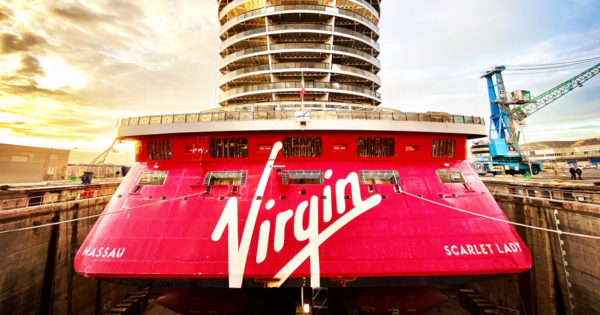Who Will Sail on Virgin Voyages’ Wilder, Adults-Only Cruise Ships?

Key insights:
When Richard Branson’s Scarlet Lady cruise ship sets sail this October, it will do so without one of the strongest advantages thought to be crucial to the recovery of the cruise line industry: hardcore cruisers.
That was by design. Virgin Voyages, Branson’s cruise line first announced in 2016, wants to attract nontraditional cruisers, folks who can’t see themselves spending a vacation out at sea, shedding the stereotypes of geriatric bingo tournaments and endless buffet lines.
Instead, the ship has a tattoo parlor onboard and hosts a drag queen brunch. Mark Ronson will be in the DJ booth, and guests can expect to “realign their chakras” at yoga classes. Oh, and it’s adults only, so guests won’t have to worry about temper tantrums.
Even the ship’s interior designer, Tom Dixon, bragged about never having worked on a cruise ship before.
“They don’t care if they’re turning off other groups like older, experienced cruisers. They want this to be hyperfocused on new customers,” said Rebecca Hamilton, professor of marketing Georgetown University’s McDonough School of Business. “They are targeting experimentalist millennials who have money to spend.”
But Virgin Voyages wasn’t planning on weathering the storm of a global pandemic, which has forced it to shelve its first summer at sea. Instead of launching in April as planned, Scarlet Lady will set sail from Miami for the Caribbean in October. A second ship, Valiant Lady, is expected to launch in Europe in 2021 and sail the Mediterranean.
A good plan, then came Covid-19
By banking on nontraditional cruisers, Virgin Voyages’ launch has become increasingly complex. The cruise ship industry became the first corporate victim of Covid-19 in the United States, after two Princess Cruises ships (owned by Carnival Corp.) became hotspots for outbreaks. In March, the Centers for Disease Control and Prevention released a No Sail Order until July 24.
As the pandemic ebbs, Carnival has already announced a “phase-in” approach to its return, set for August. Among industry experts, it is largely expected that “hardcore” cruisers—guests who take multiple cruises a year and are loyal to a specific brand—will help buoy the industry during its recovery.
“Core cruisers are crucial, in my opinion, to the cruising industry,” said Paul Golding, an analyst at investment firm Macquarie. “[They] constitute a significant proportion of cruisers from year to year.”
But according to the industry’s own trade group, Cruise Lines International Association (CLIA), Virgin’s bet made sense. This was supposed to be a banner year for the industry, carrying more than 32 million passengers, growing by almost 50% in the last decade. In a survey done prior to Covid-19, CLIA found that 66% of Gen X and 71% of millennials have a more positive attitude about cruising than in 2018.
However, Nathan Rosenberg, chief marketing officer at Virgin Voyages, refutes the characterization of a “millennial” cruise line. In fact, he said that Virgin as a brand naturally attracts an audience between ages 35 and 60. Branson himself turns 70 this July.
“I think we’ve been pigeonholed weirdly by a lot of media and the conversation about the brand as being a ship for millennials, or a ship for those new to cruising,” said Rosenberg, a Virgin veteran who’s worked for the company off and on since 2000. “The story was more about, ‘Virgin has a tattoo parlor.’”
Going adults-only is not the only change
Whether it wants to attract a younger audience or not, Virgin clearly sees an opportunity in the market, something akin to what has already happened in the hotel industry with luxury digs like The Standard, which has hotels in Miami, Los Angeles and New York. “That doesn’t exist as a concept at sea,” Rosenberg said.
https://www.adweek.com/brand-marketing/who-will-sail-virgin-voyages-cruises-passengers/